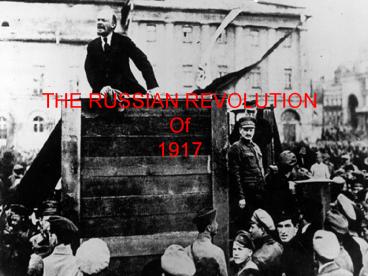THE RUSSIAN REVOLUTION - PowerPoint PPT Presentation
Title: THE RUSSIAN REVOLUTION
1
THE RUSSIAN REVOLUTION Of 1917
2
Good Books
Best Short History
Best Novel
3
Why 1917?
- Strengths of the Monarchy
- Peasants loved and revered the Czar, at least
until 1905 (Bloody Sunday) - Romanov dynasty had ruled since 1613
- The Church was extremely powerful and supported
the Czar - Government and army controlled by nobles
- Secret police and censorship
- Rights and Octobrists in the Duma who
supported the Czar
4
Why 1917?
- Weaknesses of the Monarchy
- Humiliation by Japan in Russo-Japanese war
- Many nationalities, languages, and religions
only the Romanov dynasty held them together - Russia was/is huge. 125 mil. people. Poor roads
and few railways - Out-of-date farming economy
- Problems with industrialization
- Nicholas was all-powerful but weak
- Government opposition from Kadets, Social
Revolutionaries, Communists (Menshivek and
Bolshevik)
5
Russian Revolution
- Russia suffered heavy losses in early part of WWI
(poorly trained soldiers, outdated weapons, poor
leadership by Nicholas II) - While Nicholas II was at the front, wife
Alexandra made government decisions back in
Moscow often accepted the advice of Grigori
Rasputin, who claimed to be a holy man
6
March Revolution
- As military economic conditions worsened,
Russian people became upset with czar lost the
will to fight - Civil Unrest
- Late in 1916, Conservatives assassinated Rasputin
- March Revolution working class women led
strikes in Petrograd because of bread shortages
rationing - March 12, 1917 Russian Duma takes control
forces Nicholas II to step down - New provisional government led by Alexander
Kerensky, decides to continue fighting in war
big mistake
7
Situation serious. Anarchy in the capital.
Government paralyzed. Transport of food and fuel
in full disorder. Popular discontent growing.
Disorderly firing in the streets. Some military
units fire on one another, Essential immediately
to order persons having the confidence of the
country to form new government. Delay impossible.
Any delay deadly. I pray to God that in this hour
the blame does not fall on the crown. - telegram
to Nicholas from Rodzyanko (president of the Duma)
8
"It was with a sense of awe that they turned upon
Russia the most grisly of all weapons. They
transported Lenin in a sealed truck like a plague
bacillus into Russia. - Winston Churchill
9
Lenin Bolsheviks
- Soviets (council representing workers soldiers)
challenged provisional government for power - Another political faction, the Bolsheviks, led by
V.I. Lenin maneuvered to overthrow the government
to gain support Lenin promised to get Russia
out of the war, give land to peasants, transfer
factories from capitalists to workers, transfer
government power to the Soviets - Lenin led Bolsheviks, with the help of the
Soviets, took control on Nov. 6, 1917 renamed
themselves the Communists
10
(No Transcript)
11
USSR/Soviet Union
- Under Communist rule, Russia exited WWI on March
3, 1918 via Treaty of Brest-Litovsk - Many Russians, however, opposed Communist rule
and civil war ensued - During civil war Communists executed Nicholas II
family on July 17, 1918 - Eventually Red Army, led by Leon Trotsky defeated
the Whites (those opposed to Communists) and by
1921, the Communists had control of Russia - Russia officially renamed USSR (United Soviet
Socialist Republic) in 1922, remained until
collapse in 1991
12
(No Transcript)
13
The Reasons for the Bolshevik/Red victory
- The Reds occupied the strategic center of the
nation the Whites were on the fringes. - The White opposition was ideologically fragmented
, including reformists, Mensheviks, Czarists
this wartime coalition proved to be incompatible. - Trotsky had increased the efficiency of the Red
Army, introducing strict military discipline
(deserters for example were shot) and making use
of czarist officers and their military experience.
14
(No Transcript)
15
(No Transcript)
16
(No Transcript)
17
COMMUNIST IDEOLOGY
- comm. is a modern ideology, but comm. ideas have
existed for 1000s of years - as long as people have existed in communities,
ideas of communal holdings have been around - modern comm. got its start in the latter half of
the 19th c. w/ KARL MARX - his ideology was a response to conditions of the
day just like con. lib. namely conditions
created by IR, but Marx viewed lib. as a failure
and wanted more extreme measures - Marxism now viewed as a failure, but profound
intl impact over last 150 years































